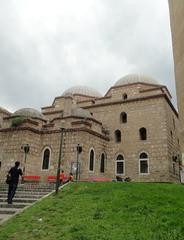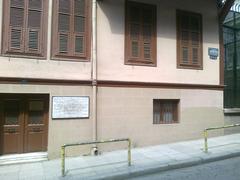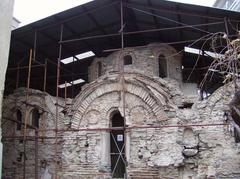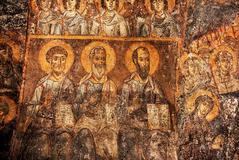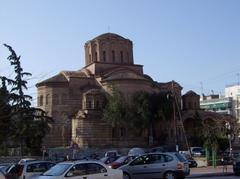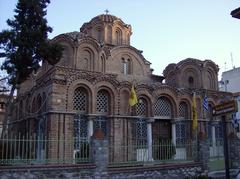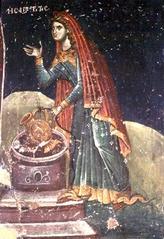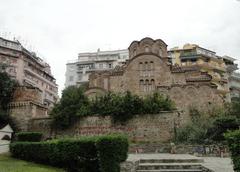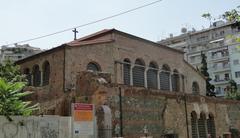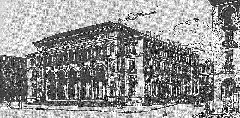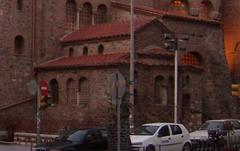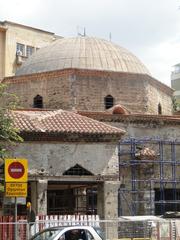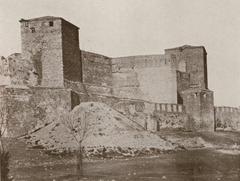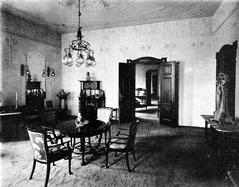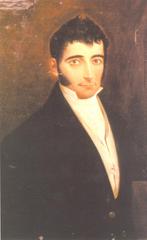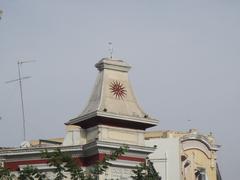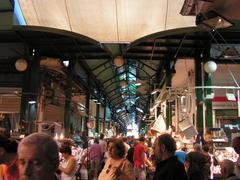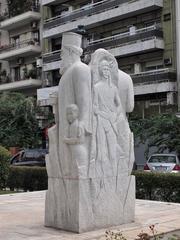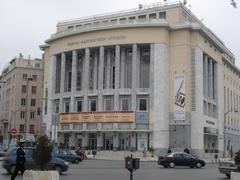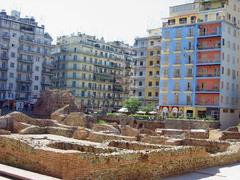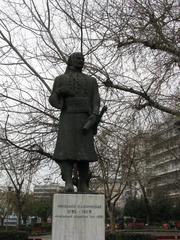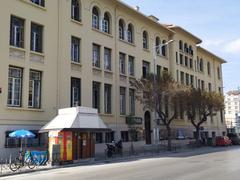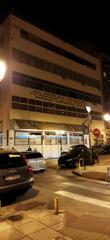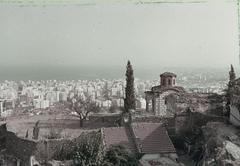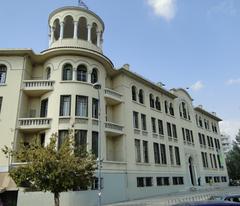Pasha House Visiting Hours, Tickets, and Historical Significance in Thessaloniki
Date: 04/07/2025
Introduction to Pasha House and Its Cultural Importance
Located in the historic heart of Thessaloniki, Greece, Pasha House—also known as Konak tou Pascha—along with the adjacent Pasha’s Gardens (Kipoi tou Pasha), stands as a testament to the city’s vibrant Ottoman past and multicultural legacy. Built during the late Ottoman era, Pasha House once served as the residence of a high-ranking official and is recognized for its compelling blend of Ottoman, neoclassical, and Moorish architectural styles. Together with the enigmatic Pasha’s Gardens, these landmarks provide unique insight into Thessaloniki’s layered identity, architectural evolution, and the enduring influence of its diverse communities.
Exploring Pasha House offers a window into the grandeur and social dynamics of Ottoman Thessaloniki. Visitors are welcomed by intricate woodwork, decorative tilework, and spacious courtyards that reflect the tastes of the cosmopolitan elite. Meanwhile, Pasha’s Gardens captivate with visionary stone structures, mysterious legends, and tranquil green spaces—making them both a haven for reflection and a subject of enduring local folklore.
Both sites are easily accessible from the Ano Poli (Upper Town) district, surrounded by panoramic vistas and other significant landmarks such as the Heptapyrgion fortress, the Byzantine city walls, and St. Paul’s Church. The combination of historical intrigue, architectural splendor, and cultural programming ensures Pasha House and Pasha’s Gardens remain essential destinations for history enthusiasts and travelers alike (Thessaloniki Tourism; Greeka; Audiala).
Ottoman Thessaloniki and the Emergence of Pasha House
Thessaloniki’s transformation under Ottoman rule (1430–1912) was profound, as the city became a key administrative, commercial, and cultural hub within the empire. The Ottomans introduced new architectural typologies, including mosques, hammams, and the grand residences of senior officials. Pasha House, constructed in the late 19th or early 20th century, reflects this era of modernization and Western influence. Positioned strategically in Ano Poli, it symbolized the authority and cosmopolitan lifestyle of its owner—likely a local pasha.
Architectural Features and Symbolism
Pasha House is a striking example of eclectic design, seamlessly combining:
- Symmetrical Facades: Harmonious exteriors with arched windows and ornate balconies.
- Decorative Interiors: Lavish wooden ceilings, colorful tiles, and stained glass, embodying Ottoman domestic opulence.
- Spacious Courtyards: Central gardens or courtyards for privacy and respite.
These elements exemplify the wealth and status of the Ottoman elite, while also upholding traditional distinctions between public and private spaces within the home.
Historical Role and Transformations
During its prime, Pasha House was a center of social and administrative life—hosting gatherings, political meetings, and embodying the multicultural spirit of Thessaloniki, which included Greeks, Turks, Jews, and others. Following the city’s integration into modern Greece after the Balkan Wars, many Ottoman structures were repurposed or fell into disrepair. Pasha House, however, survived and has since served various roles, from private residence to public office and cultural center, mirroring the city’s ongoing evolution.
Cultural Significance in Modern Thessaloniki
Today, Pasha House is cherished as an architectural gem and a symbol of Thessaloniki’s layered history. Its preservation is central to understanding the city’s multicultural heritage.
- Educational Value: Featured in walking tours and educational programs.
- Symbol of Coexistence: Reflects the influence of the city’s Ottoman and Muslim communities.
- Contemporary Inspiration: Its style influences artists, architects, and designers.
Visiting Pasha House Thessaloniki: Tickets and Hours
- Opening Hours: Tuesday to Sunday, 9:00 AM – 5:00 PM. Closed Mondays and public holidays.
- Ticket Prices: Adults €6; reduced €3 (students, seniors); children under 12 free.
- Ticket Purchase: On-site or online via the official Thessaloniki Cultural Heritage website. Advance booking is advised during peak seasons.
- Guided Tours: Available with advance booking. Audio guides and virtual tours are also offered.
Accessibility and Visitor Tips
- Accessibility: Wheelchair accessible, with ramps and elevators.
- Getting There: Reachable by bus lines 5 and 8, or taxi. Limited parking nearby.
- Best Times: Early morning or late afternoon for fewer crowds and better views.
- Photography: Permitted without flash inside.
Nearby Attractions
- White Tower: The city’s iconic landmark and museum.
- Bey Hammam: Historic Ottoman bathhouse.
- Church of Agios Dimitrios: Major basilica dedicated to Thessaloniki’s patron saint.
- Rotunda and Arch of Galerius: Monumental relics from Roman times.
Preservation and Public Engagement
Restoration efforts focus on structural stabilization and the conservation of decorative elements. The site hosts exhibitions, workshops, and community events, while public engagement is fostered through guided tours and educational programs.
FAQ: Visiting Pasha House Thessaloniki
Q: Are there discounts on tickets?
A: Yes, for students, seniors, and groups. Children under 12 enter free.
Q: Is Pasha House accessible for those with mobility challenges?
A: Yes, with ramps and elevators.
Q: Are guided tours available?
A: Yes, with advance booking. Audio guides are also offered.
Q: Are special events held at Pasha House?
A: Yes, check the official website for schedules.
Q: How do I get there from the city center?
A: Use buses 5 or 8, or take a taxi.
Pasha’s Gardens: Visiting Hours, Tickets, History, and Architectural Wonders
Introduction
Pasha’s Gardens (Kipoi tou Pasha) are celebrated for their mysterious history, visionary architecture, and tranquil setting. Below is a comprehensive guide to help you plan your visit and understand their enduring allure.
Legends and Mysteries Surrounding Pasha’s Gardens
- Origins: Built in 1904, the exact identity of the “Pasha” remains debated, with some attributing the gardens to Seifullah Pasha (Thessaloniki Tourism; Greeka).
- Occult and Mysticism: Legends link the site to Freemasons, Sufi mystics, and even Thessaloniki’s Sephardic Jewish community, though evidence is anecdotal (Balkazaar).
- “Dragon Houses” & Geomagnetic Theories: The gardens’ nickname and claims of geomagnetic energy add to their mystique (Balkazaar).
- Transformation: Post-1922, refugees used materials from the gardens to repair homes, resulting in partial dismantling (Bon Flaneur).
Architectural Features
- Visionary Design: The gardens’ imaginative forms are often compared to Gaudí’s Park Güell (Greeka; Bon Flaneur).
- Fountain Complex, Arcades, Cisterns: Central fountains, whimsical tunnels, arcades, and water management features are highlights (Thessaloniki Tourism).
- Material and Motifs: Constructed from rough-hewn stone and brick, adorned with symbols whose meanings remain uncertain (Balkazaar).
- Urban Integration: Located near the Heptapyrgion Castle, the gardens bridge old Thessaloniki and its suburbs (Greeka).
Visitor Information
- Hours: Generally open 8:00 AM – 8:00 PM (confirm seasonally).
- Tickets: Entry is free; some events may require a ticket.
- Access: Reachable by foot (20–30 minutes from city center), local bus, or taxi.
- Accessibility: Main paths are mostly flat, but some areas have uneven terrain.
- Guided Tours: Occasionally available; check local resources.
Nearby Attractions
- Heptapyrgion Castle: Byzantine and Ottoman fortress.
- Ano Poli: Historic district with traditional architecture.
- Agios Dimitrios Church: Major Byzantine church.
Visitor Tips
- Best Time to Visit: Early morning or late afternoon.
- What to Bring: Comfortable shoes, water, sun protection, and a camera.
- Family-Friendly: Includes play areas and open spaces.
- Facilities: Limited restrooms and cafés; nearby Ano Poli offers dining options.
Discover Pasha House: Visiting Hours, Tickets, and Nearby Thessaloniki Attractions
Pasha House remains a key destination for those wishing to delve into Thessaloniki’s Ottoman history. Its central location provides easy access to a wealth of other attractions:
- St. Paul’s Church: Commemorating the Apostle’s visit, featuring Byzantine and modern elements (saloniki.guide).
- Heptapyrgion Fortress & Ancient Walls: Offering panoramic city views (thetouristchecklist.com).
- Ataturk Museum: Birthplace of Mustafa Kemal Atatürk (saloniki.guide).
- Seih Sou Forest: Nearby hiking and nature trails (thetouristchecklist.com).
- Museums: Archaeological Museum and Museum of Byzantine Culture (thecrazytourist.com).
- White Tower: City’s iconic waterfront monument (thecrazytourist.com).
- Rotunda and Arch of Galerius: Roman architectural marvels (thecrazytourist.com).
- Ladadika District: Lively dining and nightlife.
- Day Trips: Pella Archaeological Site, Chalkidiki Peninsula, Peraia Beach (voyagetips.com).
Frequently Asked Questions (FAQ)
Q: What are the visiting hours for Pasha House and Pasha’s Gardens?
A: Pasha House: Tuesday–Sunday, 9:00 AM–5:00 PM. Pasha’s Gardens: Generally 8:00 AM–8:00 PM.
Q: Is there an admission fee?
A: Pasha House: Adults €6, reduced €3, children under 12 free. Pasha’s Gardens: Free entry.
Q: Are both sites wheelchair accessible?
A: Pasha House: Yes. Pasha’s Gardens: Main paths accessible, but some uneven terrain.
Q: How do I reach these sites?
A: Both are accessible via local bus, taxi, or a walk from the city center.
Q: Are guided tours available?
A: Yes, for both sites; advance booking recommended.
Summary of Key Visitor Information and Tips
Pasha House and Pasha’s Gardens together highlight Thessaloniki’s Ottoman legacy and multicultural narrative. Pasha House stands as a restored architectural marvel, while Pasha’s Gardens invite exploration with their enigmatic ruins and lush landscapes. Both sites are easily accessible, feature guided tours, and are close to significant city landmarks. Their preservation and ongoing cultural programming ensure that visitors experience the depth and diversity of Thessaloniki’s history.
For the latest information on visiting hours, tickets, and events, consult official resources and travel guides. Enhance your experience with digital tools and guided tours for immersive storytelling.
Sources and Further Reading
- Thessaloniki Tourism
- Greeka: Pasha’s Gardens
- Audiala: Pasha’s Gardens
- Balkazaar: Pasha’s Gardens
- Bon Flaneur: Gardens of Pasha
- Saloniki Guide
- The Tourist Checklist: Things to Do in Thessaloniki
- The Crazy Tourist: Best Things to Do in Thessaloniki
- Voyage Tips: Things to Do in Thessaloniki
- UrTrips Pasha’s Gardens Guide
- GoAskALocal Thessaloniki Travel Guide
- Thessaloniki Blog: Opening Hours and Tickets
For digital guides, interactive maps, and expert tips on Thessaloniki’s cultural treasures, download the Audiala app and follow us on social media.
